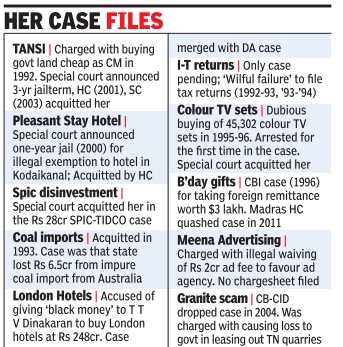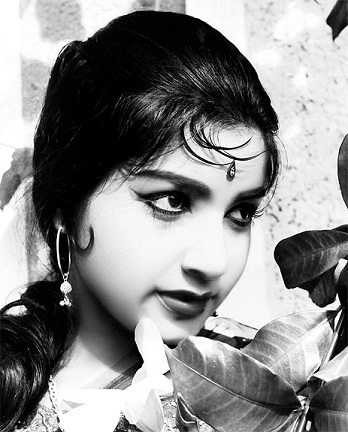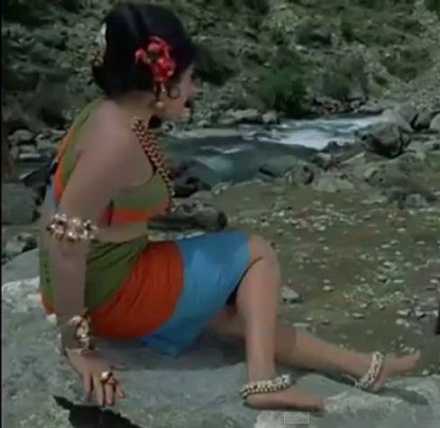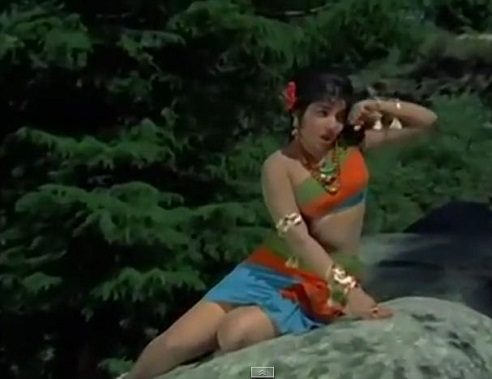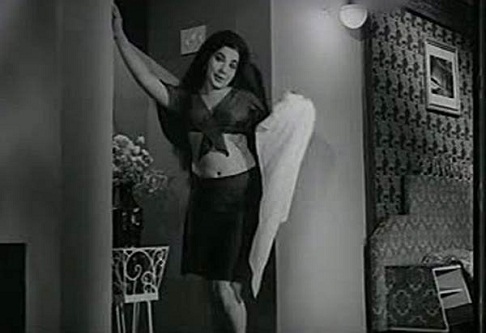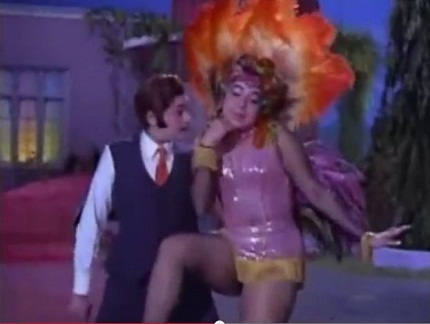Dr. J. Jayalalithaa

This is a collection of articles archived for the excellence of their content. |
Contents |
Biographical highlights
Devika Bhattacharya, 20 things you didn't know about Jayalalithaa, 05 Dec, 2016 The Times of India
J Jayalalithaa is one of India's most well-loved and revered politicians. Here are some lesser-known details about her life:
1. Jayalalithaa's mother worked as an actress in drama local drama companies and Tamil cinema. She followed in her mother's footsteps, first as a child actor. At the age of 15, she played a leading role in the Kannada film Chinnada Gombe, which became a runaway success.
2. Jayalalithaa is professionally trained in classical music, western classical piano, and various forms of classical dance, including Bharatanatyam, Mohiniattam, Manipuri and Kathak.
3. Jayalalithaa may now be referred to as Puratchi Thalaivi (Revolutionary Leader) but she is called 'Ammu' by close family members and co-stars.
4. The first time she starred alongside M G Ramachandran, one of Tamil Nadu's greatest movie stars and a former chief minister of the state, was in the Tamil film 'Aayirathil Oruvan.' (One in a Thousand)
5. She starred in one Hindi film, Izzat, opposite Bollywood superstar Dharmendra in 1968.
6. The peak of Jayalalithaa's film career occurred between 1965 and 1980. During this period, she was one of India's highest-paid actresses, and acted in over 140 films, 120 of which were blockbusters.
7. It is said that her male co-stars did not object when the film's story revolved around and was driven by the female character played by Jayalalithaa.
8. During the 1960s and 1970s, she starred opposite M G Ramachandran in a number of successful films. This forged a bond between the two, which led MGR to introduce her to politics when he was chief minister of Tamil Nadu. Jayalalithaa joined MGR's All-India Anna Dravida Munnetra Kazhagam in 1982, and was appointed the party's propaganda secretary the following year.
9. She represented the AIADMK in the Rajya Sabha between 1984 and 1989. She was elected after MGR wanted her in New Delhi for her fluency in English and knowledge of several languages.
10. When Ramachandran became unwell in 1984, it is said that Jayalalithaa attempted to take over the position of chief minister. This led to a split in the party: one faction backed Ramachandran's wife Janaki, while the other supported Jaya as his political heir.
After MGR passed away in 1987, his party split into two factions - one behind Jayalalithaa, and the other behind MGR's widow, Janaki Ramachandran. Janaki stepped aside after Jayalalithaa's faction won 27 seats in the 1989 Assembly election - 25 more than Janaki's.
11. In 1989, Jayalaltihaa was elected to the Tamil Nadu Legislative Assembly. She became the first woman to be appointed Leader of the Opposition. In the same year, the two factions of AIADMK merged and unanimously accepted Jayalalithaa as their leader.
12. During her term as Leader of the Opposition, DMK MLAs molested Jayalalithaa and nearly disrobed her while the house was in session. Media coverage of her emerging from the assembly in a torn saree, and her own comparison of the ordeal to Draupadi's cheerharan, won immense sympathy from the public.
13. In 1991, Jayalalithaa became the first female(and the youngest) chief minister of Tamil Nadu to serve a full term.
14. The obscenely lavish wedding of Jayalalithaa's 'foster son' Sudhagaran (whom she later disowned) holds the record for being the largest wedding banquet (incurring taxpayers a massive Rs 10 crore bill), attended by over 1,50,000 guests.
15. Unfortunately, the feat which won her a place in the Guinness Book of World Records proved to be her downfall in the 1996 elections.
16. Jayalalithaa returned to power in 2001, but her second term as chief minister was cut short when the Supreme Court ruled that she could not hold office while criminal cases were pending against her. She had been convicted on corruption charges in the Pleasant Stay Hotel case, though she was later acquitted and was reinstated as CM in 2003.
17. Jayalalithaa was sworn in as chief minister for the third time in 2011. But in 2014, she was sentenced to four years in jail in a disproportionate assets case. As a result, she became the first Indian chief minister to be disqualified from her post and the legislative assembly. She was granted bail after about a month in jail
18. In 2015, she was acquitted of all charges in the disproportionate assets case. Amma returned as chief minister following a landslide victory in the by-election.
19. The AIADMK leader again contested the elections in 2016 and became the first chief minister in 32 years to be voted back to power.
20. According to reports, Jayalalithaa draws a salary of just one rupee for her job as chief minister.
Childhood and teens
The Times of India, May 20, 2016
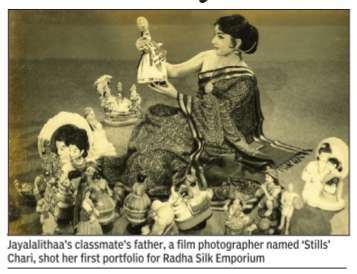
Girl who introduced friends to Alistair MacLean
For the rest of Tamil Nadu, she's Amma. But, for her classmates Srimathi and Chandini, she's still Jaya -good friend, class topper.
“Even though this is the sixth time she is becoming CM, it's hard to digest it's the same girl we knew, the girl who came first in class, the one who introduced us to Alistair Maclean, the world of Hindi movies and sketching,“ says Srimathi Iyengar about AIADMK chief J Jayalalithaa, her classmate in Sacred Heart Church Park Convent.
Srimathi adds that Jayalalithaa had one of the most enviable home libraries at the time. “She had a room in her house that had wall-to-floor cupboards filled with books of every kind. She was also the only one among us who knew Hindi, so she would take us to the movies and translate the dialogues verbatim,“ says Srimathi.
As for the sketching, it was a passion of Jayalalithaa's, and classmates would see her drawing whenever she had a free moment.
It was Srimathi's father, a film photographer named `Stills' Chari, who shot Jayalalithaa's first portfolio for Radha Silk Emporium, her introduction into the world of advertising and movies.That portfolio, says Srimathi, was part of the one she presented to actors and directors in the Tamil film industry, including MG Ramachandran, who was both her co-star and political mentor. Jayalalithaa's decision to become an actress and later join politics surprised several classmates, especially Chandini Pankaj Bhulani.Jayalalithaa, she said, wanted to study and take civil services exam but wouldn't as her mother was insisting she become an actress. “Jaya wasn't happy about it, but if that had not happened, she may never have grown into the most powerful woman in the state.“
Dr. J. Jayalalithaa: In brief
The disproportionate assets case
Lavish wedding that entangled Jayalalithaa in 18-yr-long trial



The Times of India TIMES NEWS NETWORK Sep 28 2014
CM's Vulgar Display Of Wealth Did Her In
The month of September is when Chennai seems to finally shake off the blistering heat of its summer. September also holds significance for the Dravidian movement, the city's governing ideology .Both the parties gear up to celebrate the birthdays of the big ones of the movement -Periyar and Anna -in grand style.
For nearly a year before the September of 1995, there had been whispers, including in the media, of massive corruption taking place in the AIADMK regime. A Wednesday that month seemed to prove those allegations.
The judgement
TN'S AMMA IS NOW JAIL-LALITHAA - Tough decision & a massive fine
The Times of India A Subramani Sep 28 2014
While many expected conviction in the Rs66.6 crore disproportionate assets case against Jayalalithaa and others, few were prepared for the fury of the judge, John Michael D'Cunha. He found all the four guilty of all the three charges against them. Then he sentenced them to “four years -which would deny them the immediate benefit of suspension of sentence“.Then, more importantly, he slapped a mind-boggling fine -Rs 100 crore “on Jayalalithaa and Rs10 crore each for the other three. Not stopping with that, he denied private medical facility for the TN CM outside jail campus. It is small mercy that he did not impose the maximum prescribed sentence of seven years, and, instead, limited himself only to four years.
“We could not believe that the judge did not show even an inch of leniency to the accused. Also, he accepted none of the defence arguments. It is a conviction, lock, stock and barrel,“ said a defence team member. Perhaps justifying the Rs 130 crore fine, the judge told a stunned defence team: “Do you know the present value of the seizedattached properties? I am leaving that to your imagination.“
Making a last-ditch effort to win a reprieve, the defence team even claimed that Jayalalithaa's conviction would result in a “constitutional crisis“ in TN, and that the 18-year case had made her a diabetic. When the judge remained unmoved, the defence pleaded for NSG protection for Jayalalithaa, a Z-plus category VVIP, inside jail saying she faced grave threat to her life from LTTE and fundamentalist organizations whom she had eradicated from TN. None of these arguments cut ice with the judge.
It may be bad timing for Jayalalithaa that the case should drag on for 18 years and culminate a year after the SC knocked off a protective shield available in the Representative of the People Act for sitting MPs and MLAs, like her.
“If only Section 8(4) of the Act was still alive on the statute, she would not lose the posts instantly . Or, had this verdict come before the SC ruling she would've been spared, as the SC applied it only retrospectively,“ said a jurist. Of course, since it is more than three years, she would have still ended up in jail the same evening when the verdict was read out, he added.
Rule of immediate disqualification
Jayalalithaa ceased to be an MLA with immediate effect. In convictions under other Acts and the IPC, only a sentence of over two years attracts disqualification. But if, as in this case, conviction is under the Prevention of Corruption Act, disqualification is immediate, irrespective of the quantum of jail term. TNN
The wedding of her foster son
The city witnessed a wedding celebration never before seen. It was the wedding of chief minister J Jayalalithaa's foster son. The baraat route was nearly 2km long.There were 10 dining halls, each seating nearly 25,000.Diamonds were a common sight, not among the people, but on Jayalalithaa and her associate Sasikalaa. The marriage pandal sprawled over 75,000sqft. It was clear the state machinery had been deployed in full force to make this happen.
That the groom's brothers, nephews of Sasikalaa, were under investigation by central agencies for involvement in hawala deals only seemed to reinforce public distaste.“There were several complaints of corruption against her regime in 1991-96. But, from public perception, it was the vulgar display of wealth in the wedding that turned the tide against her,“ said S Murari, a journalist who watched Jayalalithaa's film career pan out in the political arena.
Subramanian Swamy was among the first to crusade against her government. In 1995, he finally got Governor Channa Reddy's sanction to prosecute Jayalalithaa in two cases, including the Tansi case.
A successful actress who had a long innings in films, Jayalalithaa came from money . Yet, with the wedding and her dismissal of criticism of the ostentation, she ended up playing into the hands of her adversaries.
Political career
In her first term, she came across as imperious and impervious to people's concerns. The outcome of the elections that year was historical. The main opposition teamed up. A faction of Congress, the Tamil Maanila Congress, led by G K Moopanar, defying the party's decision to align with AIADMK, joined the DMKled front. Adding strength to the DMK-TMC alliance, superstar Rajinikanth campaigned in its favour, coining the catch phrase, `Even God can't save Tamil Nadu if you vote for Jayalalithaa', which became a legend.
It was a total rout for Jayalalithaa and she herself was defeated in Bargur constituency to a political novice from DMK. The crowds she got in Bargur when she campaigned comprised mostly women, some of whom said they had come only to see the jewels Sasikalaa was wearing.
Faced with charges of corruption, Jayalalithaa had vowed not to wear a single piece of jewellery until she got back her collection seized by the courts.
Dr. J. Jayalalithaa: political comebacks
TEMPORARY FALL? - `Don't write her off yet, she's bounced back before'
The Times of India TIMES NEWS NETWORK Sep 28 2014
Stepping out of her car in front of the Parappana Agrahara prison near Bangalore to hear the DA case verdict a little before 11am on 27 Sept 2014, Jayalalithaa is said to have told her driver she'd be back around 12.30pm and return to Chennai. That was not to be, but it revealed her attitude.
Some may call it temerity, but it was this quality that helped her surmount several adversities, personal and political, to bounce back to relevance -and power. If her resurrections are anything to go by, Jayalalithaa is a phoenix who has had another fall.
Jayalalithaa has fought and won a dozen cases between 1996-2014, but the DA case -given the legal and political implications -may prove the toughest.
The last time she had to relinquish the CM's post, in 2001, she had the luxury of having just come to power She came back after a Chennai trial court convicted her in the TANSI case of September 2001.
Her 7 most popular policy initiatives
YKA concluded that there were seven reasons which probably had a role to play in Jayalalithaa being such a huge name in the state.
Amma Unavagam (Mother Canteen)
One of the great successes in postcolonial India is the scheme of Amma Unavagam (Mother Canteen). It is a chain of canteens where food is provided at a highly subsidised rate. It is a hit amongst the people of Tamil Nadu. The beauty of it lies in the fact that it is not only people from the poorer sections of Tamil society who go to have food in the Amma canteens. It’s popular amongst people from affluent backgrounds as well. The scheme started in 2013.
By 2016, it had over 200 such canteens across Tamil Nadu. Curd rice and sambhar rice are always available and cost just Rs 3. Two chapattis with dal also cost the same amount. Amma and her party’s success in both the general and state elections seem to suggest that people are happy with such welfare policies in a neo-liberal setup.
Banning of alcohol in phases
After being re-elected as Chief Minister in the 2016 state elections, she decided to close 500 liquor shops across the country. Before the elections, she had promised to ban alcohol in the state in phases. Time will tell if the Tamilians who love alcohol will be robbed off their drinks or if it was one of those promises before the elections, which was never meant to be taken seriously.
The encounter of Veerappan
The encounter of Veerappan, the notorious smuggler and bandit was under the reign of Jayalalithaa in 2004. It was a huge achievement. Thousand crores had been spent on the manhunt and 130 police personnel lost their lives. It was such an important event that even the national media could no longer think of an excuse to not cover a state from South India.
Cradle Baby Scheme In 1992
The Cradle Baby Scheme, launched by the Jayalalithaa government in 1992 was started to bring an end to infanticide of girl children. Cradle baby centres were initially constructed in the Salem district and it has now spread to other districts such as Dharmadari, Madurai, Namakkal, etc. The centres are equipped with life saving drugs, bed sheets and gas connections, amongst other things. There are facts to back Jayalalithaa’s claims that it created a positive impact in Tamil Nadu. The child sex ratio in Tamil Nadu was 1000 : 942, as per the 2001 census. According to the census of 2011, it jumped to 1000: 946.
Rain Water Harvesting Scheme
In a country where water from tankers leak on the main roads and taking three showers a day is described as a need by many, Tamil Nadu is one state which has given due importance to rain water harvesting. The Rain Water Harvesting Scheme was started by Jayalalithaa’s government in 2001. The government made harvesting mandatory for all residential and government buildings. Water tables in many neighbourhoods in Chennai have risen as a result. The scheme was initiated 15 years ago. Today, the people of Tamil Nadu and Karnataka are ready to take law into their own hands as the earth can’t afford to share water anymore with everyone. Such vision of Jayalalithaa must be appreciated.
Offering freebies
She is famous for providing a lot of freebies to the voters right before the elections. It continued even in the 2016 state elections despite the debt of the state reportedly having gone up by 80 percent over the past five years. In the 2016 state elections, AIADMK promised employment to one member of each family. Students from class 11 and 12 were offered free laptops with internet and every household was promised 100 free units of electricity. She had offered freebies in the 2006 and 2011 elections as well.
Amma Salt
The most iconic freedom movement in British India, the Dandi March, began with the production of salt. The necessity of salt in everything we eat and the cheap price at which it can be obtained makes it the friend of people from all classes. How could there not be an Amma salt being sold in the state? Manufactured by the Tamil Nadu Salt Corporation, it is cheaper than the salt sold by private companies. Sodium salt costs only Rs 21 while other companies sell it for not less than Rs 25.
2014: A decline in the political career



Jayant Sriram
October 9, 2014
Jayalalithaa's delaying tactics have ensured there is no easy way out for her
An hour later, those cheers of joy turn into anger as news arrives that the court has denied bail. Within minutes, AIADMK workers organise street protests and sit-ins. Outside Jayalalithaa's Poes Garden residence, hundreds of women hold the railings and wail. Scenes reminiscent of the day the former chief minister was convicted. Trial and punishment is nothing new for her but the growing anxiety among her supporters stems from the realisation that there is no easy way out this time.
When she was elected as chief minister for the first time back in June 1991, Jayalalithaa's assets were declared at almost Rs.3 crore. Five years later, they had zoomed up to nearly Rs.66 crore. This sudden growth had not gone unnoticed, and there were those waiting to take her down. In 1996, Jayalalithaa and the AIADMK were humiliated by the DMK in the Assembly elections-221 to four. A big part of their election campaign was their promise to bring to book all those who had indulged in corruption during Jayalalithaa's first term. Several cases of corruption were slapped on her by the new government. Along with them, a private complaint was filed by then Janata Party leader Subramanian Swamy in 1996, claiming that she had acquired a disproportionate amount of wealth during her term as chief minister.
This September 27, Jayalalithaa, in the middle of her third and most successful spell as chief minister, was pronounced guilty by a special court hearing the disproportionate assets (DA) case and sentenced to four years in prison. Unless the verdict is reversed in appeal, she will be unable to contest elections for 10 years, a consequence that could alter Tamil Nadu politics forever. Five parliamentary elections were held during the pendency of the DA case. The special court hearing her case in Bangalore had five different judges. Jayalalithaa has fought many battles and, by all accounts, had even learnt the lessons of the past. But it was the alleged excesses of those first few years in power that have finally been her undoing.
The investigation
The Tamil Nadu Principal Sessions Judge asked the police to investigate Swamy's complaint and an FIR was filed by N. Nallamma Naidu, superintendent of police, Directorate of Vigilance and Anti-Corruption, in September 1996. Naidu and his team of investigators uncovered several illegal land deals within a few months, meticulously charting the money trail involving the various shell companies which were used to purchase land by the former CM and her associates Sasikala Natarajan, J. Ilavarasi and V.N. Sudhakaran. Many of these companies were found to be registered out of 36 Poes Garden, Jayalalithaa's official residence. The team had a warrant to search her house but decided to wait.
They then had a stroke of luck. In December 1997, the Crime Branch Criminal Investigation Division (CBCID) which was conducting an investigation into another case filed against the AIADMK leader-of alleged financial irregularities in the procurement of colour TVs for village panchayats-decided to raid her house and arrest her. The vigilance officials then turned up to famously discover 1,000 pair of shoes, 25 kg of gold, and 800 kg of silver, among other things.
Even as a detailed charge sheet was being filed in court against Jayalalithaa and her three associates for illegal wealth amassed in India, the DMK found possible links to another set of transactions carried out in the UK for Jayalalithaa through Sasikala's nephew TTV Dinakaran. The case was already being investigated by the Enforcement Directorate but the Tamil Nadu team joined in. By 2000, they thought they had discovered evidence of a hotel and a resort bought illegally in the UK. A charge sheet was promptly filed and the DMK put a lot of faith in the London Hotels case believing that it uncovered an even bigger trail of corruption and illegal land deals.
Trial and delay
Meanwhile, the DA case had started in 1997, and the first problem arose when the Tamil Nadu Principal Sessions Judge declared that he had too many cases before him and asked for additional special courts to be set up to hear corruption cases against politicians. Three additional courts were set up but Jayalalithaa and her co-accused challenged the constitution of these courts and their competence to hear the cases.
Alongside these challenges, Sasikala asked that all the documents in the case be translated to Tamil as she did not understand English. A frustrated prosecution took the matter to the Supreme Court but finally gave in. Nearly a year was wasted in translating all documents and the trial commenced in 1999.
By August 2000, the prosecution had examined all 259 of its witnesses and it was now the defence's turn. It dragged its feet, barely managing to examine eight witnesses. Then, in the summer of 2001, the tables were turned. Jayalalithaa stormed back in the Assembly elections and, though she could not assume power due to her initial conviction in the TANSI case, was back as chief minister by 2002. The defence lawyers sprung into action. Seventy-six witnesses were recalled and 64 of them turned hostile, saying they had testified under pressure.
The Karnataka chapter



In 2003, the DMK became formally involved with the case, with the party's general secretary K. Anbazhagan filing a petition in the Supreme Court asking for the trial to be transferred out of Tamil Nadu. In November 2003, the Supreme Court ordered that the trial be moved to Karnataka and that day-to-day proceedings be conducted. "Be you ever so high, the law is above you," a bench of Justices S.N. Variava and H.K. Sema observed scathingly.
B.V. Acharya, a former advocate general appointed as special public prosecutor by the Karnataka government, immediately faced a setback when the London Hotels case was clubbed with the DA case. It came as a blow to the prosecution, which didn't have a strong enough case for London Hotels and viewed the two cases as separate money trails. In August 2005, the Supreme Court stayed proceedings to decide on the merger of the two cases. The stay would last five years.
The DMK, now back in power after the Assembly elections of 2006, decided to close the hotels case in 2009. In 2010, the prosecution was finally allowed to recall some of the witnesses who had turned hostile and get them to revise their statements. But further delays ensued as applications were moved by Jayalalithaa saying that she could not appear in the special court as the security provided by the Karnataka government was not adequate. Her co-accused, Sasikala, asked that a translator be appointed and that her answers be translated from Tamil to English. She then objected to the use of active voice instead of passive voice and vice versa.
To make matters worse, after Jayalalithaa returned to power in 2011, the Tamil Nadu vigilance directorate wrote to the court saying they would be carrying out further investigations in the case. The Supreme Court quashed this request, calling it an attempt to "frustrate the trial". By now, Acharya was also a target. He had been appointed as advocate general (AG) for a sixth time in 2011 and the accused contended that he could not act as AG as well as special public prosecutor. When Acharya chose to give up the AG's post, another complaint was filed in the state Lokayukta regarding irregularities in an educational trust that he was part of. The proceedings were quashed in the high court but an exhausted Acharya resigned as special public prosecutor in August, 2012.
Prosecuting Trouble
In February 2013, G. Bhavani Singh was appointed special public prosecutor in the case. Almost immediately, his role became shrouded in controversy. In August, the DMK moved a petition questioning the fairness of court proceedings under him. "The defence had suddenly reduced the number of its witnesses and we noticed that he had allowed the Tamil Nadu Deputy SP of Directorate of Vigilance and Anti-Corruption to be listed as a defence witness. Which investigating officer would appear as a defence witness?" asked a DMK functionary tracking the case.
When a complaint was filed against Singh in the Supreme Court, the Karnataka government intervened and removed him saying that his was not one of the names originally considered for the post. Then, in a surreal move, the accused moved an application to keep him on as public prosecutor as well as the judge who was to retire on September 30. "Nobody had ever seen a case where the accused asked for a certain prosecutor to stay on. Incredibly, the reason given was that the accused had a right to speedy trial," a lawyer present at the proceedings said.
The Supreme Court allowed Singh to continue but the judge in question, M.S. Balakrishna, chose to retire. After 17 years, the most significant moment in the case came in October 2013, when the Karnataka High Court appointed Special Judge John Michael D'Cunha. A former district judge who had been registrar of vigilance at the Karnataka High Court, D'Cunha ensured that the case moved without delay, finishing the remaining arguments in less than a year. In one notable instance, he even fined Singh Rs.60,000 for not turning up in court for two days.
The role of the public prosecutor Bhavani Singh continues to be controversial. According to news reports from Jayalalithaa's bail hearing in the high court on October 7, the prosecution had initially objected in writing to the accused being given bail. Later, inexplicably, they changed their stance to say they had no objection if the accused were given conditional bail.
The Karnataka High Court refused bail and, according to legal experts, no court is likely to give bail anytime soon given the nature of in the case. Even Lalu Prasad Yadav, they point out, was in jail for 10 months. In his case, the Bihar government notified a guest house as a jail, and kept him there in comfort. But with the proceedings moving out of Tamil Nadu, Jayalalithaa forfeited the chance of any such arrangement. She seemed to believe that there was no chance of a conviction or that the case would simply go on indefinitely. The road ahead looks far more difficult now.
Arithmetical error in Karnataka high court's verdict
The Times of India, May 13 2015
Vasantha Kumar
HC got its maths wrong in Jaya case: Special prosecutor
The special public prosecutor in the disproportionate assets case against J Jayalalithaa and three others claimed that there was a glaring arithmetical error in Karnataka high court's verdict. Justice C R Kumaraswamy had acquitted all four in his 919-page verdict. SPP B V Acharya said if the mathematical mistake was set right, the quantum of disproportionate assets owned by Jayalalithaa would be in excess of 76% of her known sources of income and not 8.12%, the figure arrived at by the HC. The acquittal was premised on a Supreme Court judgment permitting disproportionate assets less than 10% of the known income.
Acharya referred to page 852 of the verdict, where the judge had calculated the loans that 10 companies of the accused had borrowed from nationalized banks, and page 913, where the disproportionate assets were quantified. “The total loan amount is calculated at Rs 24, 17, 31,274 (page 852). However, if added correctly, it sums up to Rs 10, 67, 31,274. This fundamental mistake in adding the individual loan amount has inflated the income by Rs 13.5 crore,“ Acharya told TOI. “The wrong figure has been used in the end (page 913) to calculate the accused's income and also the disproportionate assets. The total assets have been shown as Rs 37, 59,02,466, the income as Rs 34,76,65,654 and the differential amount as Rs 2,82,36,812. Using these figures, the judgment puts the disproportionate assets at 8.12% of her income. But if added properly , it would be 76.70%,“ the SPP said.
Acharya said for the future course all options were under consideration, including filing of an SLP before the apex court, as the glaring mistake had come to the prosecution's notice.
The prosecution had calculated Rs 66.65 crore as disproportionate assets based on the cost of construction of buildings owned by the accused and the expenses incurred on the lavish marriage of Jayalalithaa's foster son VN Sudhakaran, the third accused in the disproportionate assets case.However, the trial court had slashed the amount to Rs 53.60 crore, holding the trial court's figures as exaggerated.
Take the case to SC: PMK chief to Karnataka CM
The Times of India May 14 2015
Delegation hands over letter to CM Siddaramaiah
PMK president G K Mani and legal wing leader K Balu met Karnataka chief minister Siddaramaiah in Bengaluru on Wednesday and presented a letter from their party chief S Ramadoss. The letter urged the Karnataka government to file an appeal in the Supreme Court against the order passed by Justice C R Kumaraswamy , of the Karnataka high court, who acquitted AIADMK chief J Jayalalithaa and three others in the disproportionate wealth case.
“We met the chief minister at his residence and asked him to pursue the case in the Supreme Court. He promised to consult the legal department and advocate general and decide,“ said Balu. After meeting the chief minister, the PMK team also called on the chief secretary Kaushik Mukherjee, special public prosecutor B V Acharya and advocate general Ravi Varma Kumar.
“The AG said it was a fit case for appeal as there are clerical and accounting errors and we have a good case,“ said Balu. Acharya too is in favour of moving the Supreme Court though this was not about DMK or AIADMK but a way to root out corruption, said Balu.
Meanwhile, opposition parties in Tamil Nadu continued to air their displeasure at the order passed by Justice Kumaraswamy . PMK chief S Ramadoss, who had earlier slammed the “glaring arithmetic error“ in the verdict, found fault with the way the court assessed the gifts she had received.“On pages 853 and 854, the order mentions gifts received by Jayalalithaa on her birthday . The judge has added `1.50 crore as income which is against the law,“ said Ramadoss. “Though it is common for politicians to get gifts on their birthdays, no minister or chief minister can receive any gifts during their term in office. Thus it is illegal for Jayalalithaa to receive gifts while being chief minister and it is even more intriguing how it can be treated as income.“
The gifts case is pending before the Supreme Court and approving the act of taking a gift and including it as income sets a bad precedent for other politicians, the PMK chief said. Considering all these facts the Karnataka government should go on appeal against the judgment, he said.
Denying reports that he had greeted Jayalalithaa on her acquittal, MDMK chief Vaiko said the foundation (of the case) had collapsed due to an arithmetic error in the verdict.“This has been confirmed by experienced advocate Acharya. There is a Himalayan difference between truth and justice in this case,“ he said.
Need four days to read order: Karnataka minister
Even as pressure mounted on the Karnataka government to file an appeal in the apex court against the high court verdict acquitting Jayalalithaa, the government kept cards close to the chest. Karnataka CM Siddaramaiah said the government is consulting legal experts. “We need three to four days to read the judgment . Once it's done, we will consult experts to take a decision,“ Karnataka law and parliamentary affairs minister T B Jayachandra said.
Prosecutor without voice
The Times of India, May 12 2015
A Subramani
India will rarely ever see a case stranger than the disproportion ate wealth case which former chief minister of Tamil Nadu Jayalalithaa had been battling for about 19 years. This is the first case and hopefully the last which got a prosecutor after the court concerned completed the proceedings and reserved the matter for judgment. Justice C R Kumaraswamy of Karnataka high court reserved orders in the wealth case appeals on March 11, 2015, but the appeals got a legal special prosecutor only after the Supreme Court order on April 27, 2015. In the end, a corruption case with immense socio-political consequence has been decided without a prosecutor's arguments in court.All that Justice Kumaraswamy had before him were special judge John Michael Cunha's 1,067-page judgment, and written arguments of new special prosecutor B V A ch a r ya , S u b r a m a n i a n Swamy and K Anbazhagan.
She faced the ignominy of being convicted thrice in the Pleasant Stay Hotels case, TANSI case and the disproportionate assets case after being prose cuted by an agency which took orders from her own government. “It is like a servant prosecuting the master.As the chief minister, she was simultaneously boss of the directorate of vigilance and anti-corruption (DVAC), and an accused before the same agency,“ said a former prosecutor. “Therefore, when it won its case featuring Jayalaltihaa, the agency must have laughed inside and wept outside,“ he said.
2016: Illness
Jayalalithaa, the incumbent Chief Minister of Tamil Nadu was admitted to Apollo hospital in Chennai In Sept 2016. According to a news report, the hospital said that she was admitted due to fever and dehydration. Life came to an uncomfortable standstill for millions of her supporters, who saw light only in her.
[After waiting for twenty days, when there was no sign of Jayalalithaa’s quick recovery] the Tamil Nadu Governor Vidyasagar Rao allocated the portfolios held by her to Finance Minister O Panneerselvam, but said the AIADMK leader will continue to be the chief minister. First Post, Oct 12, 2016
"Under Clause (3) of Article 166 of the Constitution of India, the Governor of Tamil Nadu today allocated the subjects hitherto dealt by Chief Minister J Jayalalithaa to O Panneerselvam," a Raj Bhavan press release said.
This was the third time in his career that the 'Amma' loyalist had stepped up for his leader: first, in September 2001, where he was the interim CM for six months when Jayalalithaa was disqualified by the Supreme Court in the Tansi land deal case and second in September 2014, after a Bangalore court sentenced Jayalalithaa to four years in jail and fined Rs 100 crore in a corruption case.
On 5 Dec 2016 Jayalalithaa passed away after a cardiac arrest.
Filmography
As an actor
1961 Epistle
1961 Shrishaila Mahatme
1964 Chindha Gambhe
1964 Mane Aliya
1964 Murudan Muthu
1965 Ayirathil Oruvan
1965 Kannithai
1965 Manashulu Mamatalu
1965 Nee
1965 Vennira Adai
1966 Aame Evaru
1966 Aastiparulu
1966 Badukuva Daari
1966 Chandorodyam
1966 Gowri Kalyanam
1966 Kumari Penn
1966 Lorry Driver
1966 Major Chandrakant
1966 Mani Makudam
1966 Motor Sundaram Pillai
1966 Muharassi
1966 Navarathri
1966 Saraswathy Sapadham
1966 Thanipiravi
1966 Yaar Nee
1967 Arasa Kattali
1967 Chikkadu Dorakadu
1967 Goodachari116
1967 Gopaludu Bhoopaludu
1967 Kandan Karunai
1967 Kavalkaran
1967 Madi Veettu Mappillai
1967 Magarasi
1967 Naan
1967 Raaja Veetu Pillai
1967 Thaikku Thalaimagan
1968 Andru Kanda Mugam
1968 Attagaru Kottakodalu
1968 Bagdad Gajadonga
1968 Bommalattam
1968 Buthisaligal
1968 Enga Ooru Raja
1968 Galatta Kalyanam
1968 Izzat
1968 Kanavan
1968 Kannan En Kathalan
1968 Kathal Vaghanam
1968 Kudiyiruntha Koyil
1968 Moonrezuthu
1968 Muthu Chippi
1968 Niluvu Dopidi
1968 Oli Vilakku
1968 Pannakarai Pillai
1968 Pudhiya Bhoomi
1968 Rahasya Police115
1968 Sri Ramakatha
1968 Sukha Dukhalu
1968 Ther Thiruvizha
1968 Tikka Shankaraiah
1968 Brahmachari
1969 Aadarsa Kutumbam
1969 Adimai Penn
1969 Adrushtavanthalu
1969 Daivamagan
1969 Gandikota Rahasyam
1969 Gurudakshinai
1969 Kadaladu Vadaladu
1969 Katha Nayakudu
1969 Mattukkara Velan
1969 Nam Naadu
1970 Alibaba 40 Dongalu
1970 Anathai Ananthan
1970 En Annan
1970 Enga Mama
1970 Engal Thangam
1970 Engiruthu Vandhal
1970 Pathukappu
1970 Saraswathi
1970 Shri Krishna Vijayam
1970 Thedi Vanda Mappillai
1971 Adi Parasakthi
1971 Annai Velankanni
1971 Bharya Biddalu
1971 Kumari Kottam
1971 Neerum Neruppum
1971 Oru Thai Makkal
1971 Savale Samali
1971 Shri Krishna Satya
1971 Sumathi En Sundari
1971 Thanga Gopuram
1972 Akka Thamudu
1972 Annamitta Kai
1972 Dharmam Enge
1972 Neethi
1972 Pattikada Pattanama
1972 Raja
1972 Raman Thediya Seethai
1972 Sakthi Leelai
1972 Thikku Theriyadha Katil
1973 Devudu Chesina Manushulu
1973 Dr. Babu
1973 Ganga Gauri
1973 Jesus
1973 Pattikatu Ponnaiah
1973 Suryagandhi
1973 Vandhale Magarasi
1974 Anbai Thedi
1974 Anbu Thangai
1974 Baghdad Perazhagi
1974 Premalu Pellilu
1974 Shanmugapriya
1974 Thayi
1974 Thirumangalyam
1974 Vairam
1975 Avalukku Aayiram Kangal
1975 Avanthan Manithan
1975 Baaghi Lutera
1975 Barah Ghante
1975 Cinema Paithiyam
1975 Pattam Bharathamum
1975 Thiruvarul
1975 Yarrukkum Vetkam Illai
1976 Chitra Pournami
1976 Gurudakshinai
1976 Jai Jagat Janani
1976 Kanavan Manaivi
1976 Tu Hi Kaali Tu Hi Durga
1976 Tu Hi Ram Tu Hi Krishna
1976 Unmaye Un Vilai Enna
1977 Amar Shilpi
1977 Shahzadi Mumtaz
1977 Shri Krishna Leela
1977 Soorya Kanthi
1977 Unnai Sutrum Ulagam
1979 Mata Velankanni
1980 Nadhiye Thedi Vandha Kadal
1980 Nayakudu Vinayakudu

